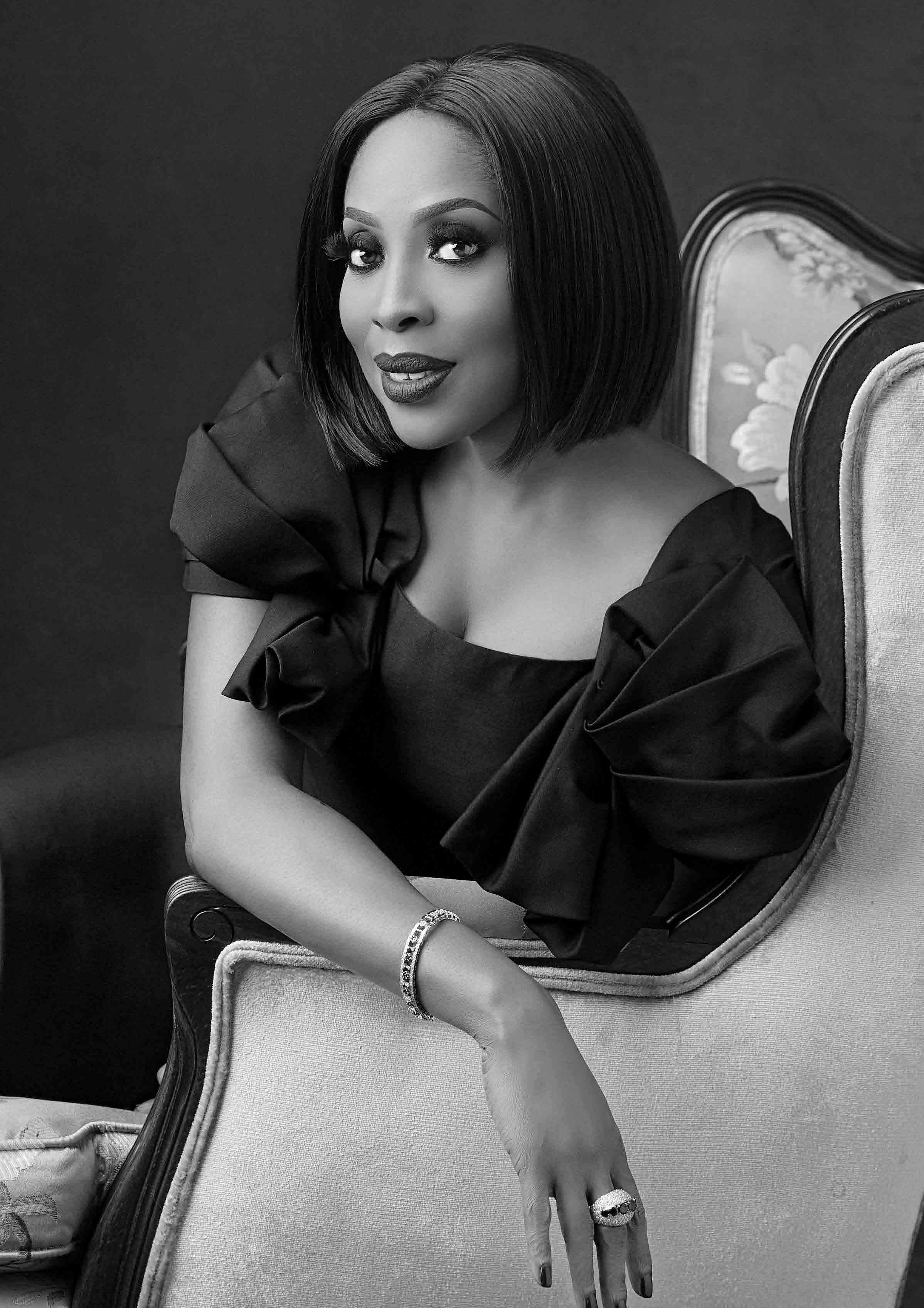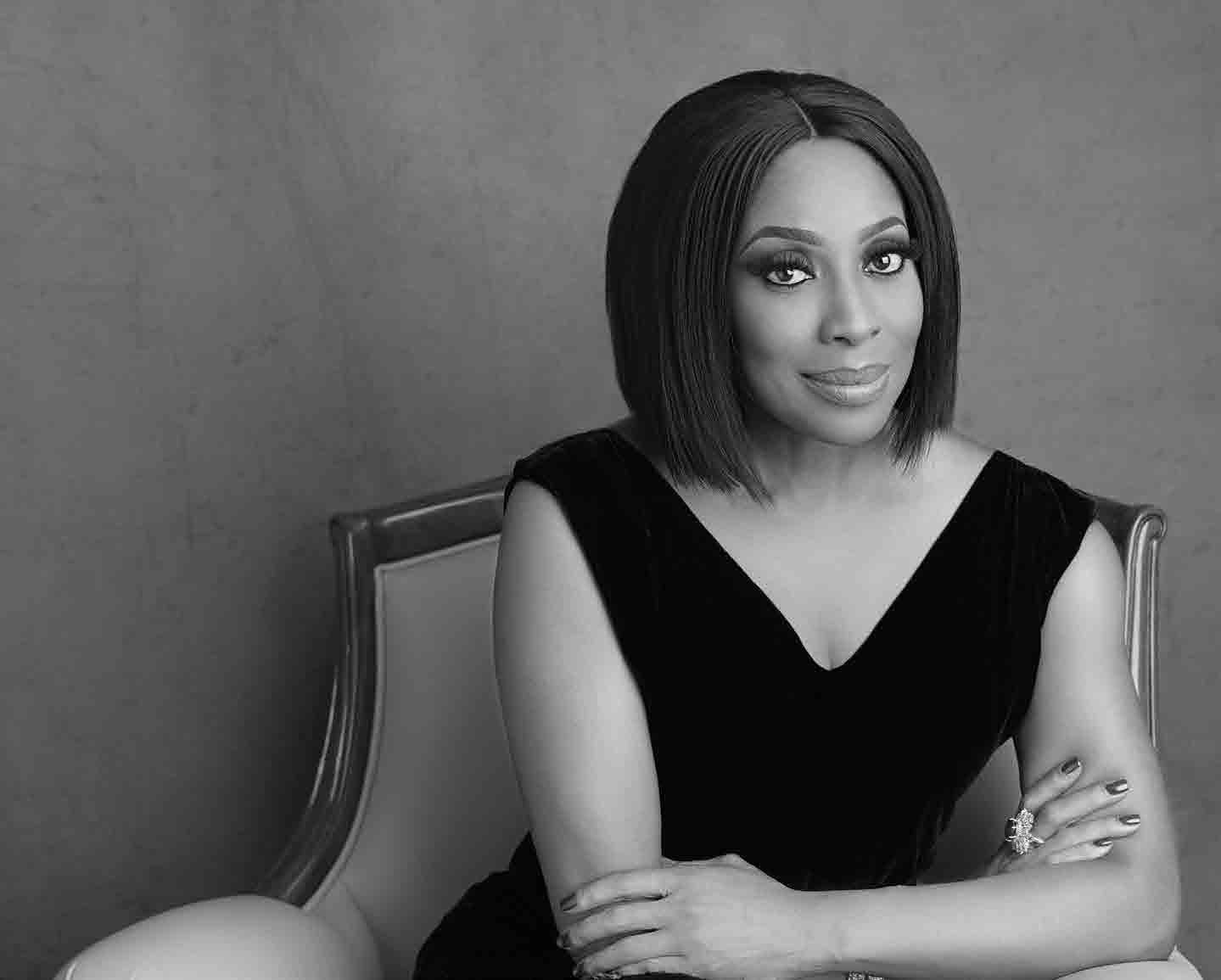
7 minute read
‘MY CAREER HAS BEEN A REAL JOURNEY’
For many people reading this, media mogul and entrepreneur Mosunmola Abudu (you can call her Mo!) will need no introduction. Forbes dubbed her Africa’s most successful woman; The Hollywood Reporter, one of the ‘25 Most Powerful Women in Global Television’; CNN, ‘Africa’s Oprah’. But long before her breakthrough TV show Moments with Mo or her pan-African TV channel EbonyLife TV were even in embryo, Mo had a past life as, among other things, a model, an Avon brand ambassador and an HR professional.
Born in West London, but with family roots in South West Nigeria, Mo split her formative years between Nigeria and the UK, something Mo feels gave her “the best of both worlds”.
Advertisement
“For all intents and purposes, I’m actually British, but for me I identify more with being Nigerian,” she says. “The culture of Nigeria is something that has never left me. It’s something that I’ve grown accustomed to.”
Mo’s Nigerian grandmother, in particular, had a huge influence on her when she was growing up, she says, instilling in her the values of honesty, integrity and hard work. Most importantly, she says, her grandmother taught her to always be content with what she has.
“Being content doesn’t mean you can’t dream of more,” she says. “Because I’ve always wanted to do big things.”
When Mo embarked upon Westminster’s Manpower MA, almost 30 years ago, she was already balancing her recruitment career with caring for her young daughter.
At the time, Westminster was one of the few universities to offer this course, she explains, and the degree of flexibility it offered was equally rare.
“I’d always wanted to go to a uni where I felt a sense of freedom and I felt that you could just get into the mix and you could still manage the rest of your life at the same time,” Mo says. “I liked the fact that it was really going to be about me and the freedom to just work at uni, work at home and get the results I wanted.”
After completing her Masters in 1993, Mo returned to Nigeria. As well as heading ExxonMobil’s national Human Resources and Training unit, she also established Vic Lawrence & Associates, now one of the country’s leading HR consultancies.
Here, perhaps, the story could have come to an end, but for Mo it was merely a prologue.
The decades that followed saw her create, produce and host her own talk show, Moments With Mo (with famous guests including Hillary Clinton) before launching EbonyLife TV in 2006, a network currently airing in more than 49 countries across Africa, as well as the UK and the Caribbean.
Mo established EbonyLife Films in 2014. Since then, the company has produced three of Nigeria’s biggest films of all time, including Mo’s first film as executive producer, Fifty (2015), and The Wedding Party, a 2016 collaboration with The ELFIKE Collective, which became Nigeria’s highest-grossing film of all time.
Following high-profile collaborations with Sony and AMC Networks (USA), EbonyLife has just signed a deal with Netflix to create original TV series and Netflix-branded films for its global streaming service.
“It’s the first deal of its type ever to be signed in Africa and in Nigeria,” Mo explains. “It’s what’s called a multiple deal in that we have a slate of projects that we’re going to be rolling out over the next few years.”

At the end of last year, Mo opened Ebonylife Place: Nigeria’s first luxury entertainment and lifestyle resort in Lagos, which includes a boutique hotel, cinemas, restaurants, meeting rooms and an events space (where “you can feel the brand,” Mo explains).
While you could be forgiven for calling her a queen of reinvention, Mo feels her HR and media careers are not as different as they would first appear.
“Human resources is about finding talent,” she says. “It’s about nurturing talent; it’s about building talent – it’s about making sure people come out at the other end better than they were when they started.”
This love of “nurturing talent” lives on in her modern-day media incarnation.
“What I love about the work is the ability to discover new talent, the ability to build that talent and for them to come out as shining stars.”
At a deeper level, embarking upon Moments with Mo and EbonyLife was born out of a lifelong desire to tell African stories the way they need to be told, and giving voices to those who have been marginalised and misrepresented for too long.
“It’s been a long time coming, but the dream was to create content that is representative of the continent,” Mo says. “Of me as a Black woman and of Black people across the globe and, especially for Africans, and more so for Nigerians, because I am a Nigerian and that’s the culture that I understand.”
The recent upsurge of Black Lives Matter and the murder of George Floyd are a poignant reminder of this.
Mo believes the movement, and its current momentum, have huge potential to be a catalyst for change – particularly at this time when COVID-19 is forcing everyone to stand still for a moment and take stock.
“It’s a long-overdue realisation that we have come to, and I’m glad it has happened in my lifetime,” she says. “I have a grandson who’s a few months old. I don’t want him to witness the world of inequality and injustice and fear of going
out on the streets because he may be picked up because of the colour of his skin. I want him to have the opportunities that everyone else has. And I think what has happened is there’s a consciousness that’s awakened about the fact that things need to change. And there’s a shift – I’m hoping and praying that shift is a permanent shift.”
The message of Black Lives Matter, in Mo’s view, relates closely to her own mission over the past 15 years, to tell the stories of Black and African people.
“It’s taken the death of this man for the world to take notice of the fact that there

needs to be change,” says Mo. “Black stories matter. We need to change the narrative. We have a treasure trove of stories about our continent of Africa, about Black people all over the world, but their stories have just never been told. I think we have the right for our stories to be told, the same as any other person in this world deserves the right to be represented and to be seen. And that’s the battle – I call it a battle because it has been a battle actually. Sort of knocking on doors and saying, ‘I’m here, hello – let me in!’”
An integral challenge in this “doorknocking”, Mo says, has centred on her identity, not just as a Black woman, but as a Black African woman.
“We’re still playing catch-up with issues of equality,” she says, of the continent.
Her 30-year-old daughter, Mo tells me, recently needed her husband’s permission, by law, to renew her own passport.
Mo herself has often faced backlash for “wanting to do big things”.
“I have been called ‘overambitious’ by some men,” she says. “They felt ‘Why don’t you do this little thing? Why are you trying to do this big thing? Why? Look after your children!’”
And what advice does she have for Westminster’s new and recent graduates reading this article, who are just now embarking upon their careers in these uncertain times?
“The most important advice I can give to anyone is focus, is be consistent about the things that you want to do and find what you are most passionate about, please,” she says. “If you can’t get up in the morning to pursue that dream, then it’s not yours.”
As someone who has devoted her career to vast long-term projects, Mo believes it is this “passion” which is “infectious” and sells your vision to other stakeholders and keeps you going to the end.
“There’s no such thing as overnight success,” she says. “Sometimes all you see is the success after it has arrived.”
Moments with Mo, for example, took three years to get off the ground; EbonyLife TV another four after that. (“Big projects take time, they really do.”) Having said that, sometimes you also need to know when to quit. Or at least to put things on hold.
“I do believe in keeping at things for as long as I can possibly keep at it for – I will keep going,” she says. “But sometimes you’re going to run into a complete dead end, and when you do, it’s OK.”
So, in some ways, is it more about the journey than the end result?
“I don’t ever think there’s an end result,” Mo says. “As long as you have life, you are breathing, you are on a journey.”








